Erwin Rommel: the 'Desert Fox'
Erwin Rommel was perhaps Germany's most famous soldier during World War II. A brilliant battle tactician known as the "Desert Fox," he was known for his experience as a tank commander. 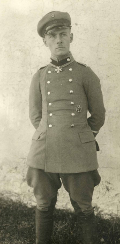
Rommel was born in Heidenheim on Nov. 15, 1891. He wanted to study engineering, but his father, then a teacher, convinced him to follow in his footsteps and join the military instead. He joined the German Army as a cadet in 1910 and fought in World War I, in France, Italy and Romania. He sustained wounds to an arm, a shoulder, and a thigh. Even as a young platoon commander, he showed flashes of the brilliance that he would display in World War II, achieving tactical surprise by moving faster than the enemy thought possible. He was part of a German contingent of reinforcements that fought with Austro-Hungarian forces at the Battle of Caporetto, which resulted in a rout of Italian troops. Rommel won Germany's highest honor, the Order of the Pour le Merite (Blue Max), for his actions in this battle, leading a surprise attack that captured Mount Matajur and sent a large contingent of Italians reeling. In three days, he and his men captured 9,000 men and 81 big guns. After the war, Rommel headed up a regiment tasked with keeping the peace in a Germany that was reeling from its defeat and from a period of economic and political unrest punctuated by the enormous reparations that it was having to pay to the victors. In 1929, he signed on as an instructor at the Dresden Infantry School, moving from there to be Commander of the German War Academy. He wrote the book Infantry Attacks, which was adopted by the army as part of cadet training. 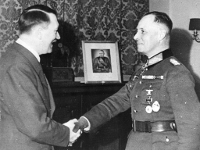
Rommel was quite taken with German leader Adolf Hitler's vision at first. Hitler had read Rommel's book and had expressed an admiration for him as well, appointing him to command his personal bodyguard during the invasion of Poland in 1939. Rommel won command of the 7th Panzer division as it and the rest of the Wehrmacht rolled through France in 1940. His force captured more than 100,000 Allied troops. His next assignment was as commander of the Afrika Corps, a newly commissioned force created to oust the Allies from North Africa. 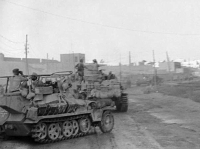
It was there that he earned his famous nickname, the "Desert Fox." Italian forces had been unable to stem the tide of British attacks in the region, and Rommel set about shoring up the Italian war effort. He pushed his men hard, traveling and striking quickly and then moving on. The result was German ascendancy in the region–for a time. Among his successes in North Africa was the taking of the strategic port city of Tobruk in 1942. It came after a protracted siege and resulted in the capture of 30,000 Allied prisoners, 2,000 vehicles, and large amounts of food and fuel. Hitler rewarded Rommel with the field marshal's baton after this victory. Rommel understand only too well the importance of supply lines, and his were at an ebb in October of 1942. At the Second Battle of El Alamein, British forces under Gen. Bernard Montgomery trapped Rommel's forces between the British and the sea. Rommel managed to sidestep defeat a few times but eventually lost control of North Africa and was recalled. 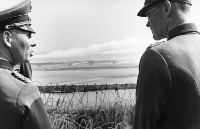
Hitler sent Rommel to Greece and Italy for a time, then appointed him to shore up the defenses in Brittany and Normandy, in preparation for an Allied invasion there. He improved the defenses of the vaunted Atlantic Wall of the Third Reich's Fortress Europe. Rommel was firmly convinced that Allied air power would render moot any German counterattacks if Allied land forces broke through the beach defenses and into France, and so his plan was to keep his vaunted panzer divisions in reserve and release them only when the Allied invasion point had been confirmed. He set about trying to ensure that the Atlantic Wall was unbreakable; among his directives was the deployment of millions of mines, on the beaches and in the water just offshore. Rommel was with his wife, Lucie, on her birthday on June 6, 1944, and so he missed the opportunity to strike back right away when the D-Day invasion began. In addition, although the Allied troops certainly knew that they were landing at Normandy, the German high command didn't necessarily know that because an Allied counterintelligence effort had successfully convinced the Germans that the Normandy landings were a feint and that the main invasion force would be landing somewhere else along the French coast, perhaps at Calais, the point closest to the United Kingdom. Hearing of the Allied breakthrough, Rommel tried to convince Hitler to pull back to the Seine, in order to form a more defensible position. The Fuhrer would brook no retreat, and a furious Rommel talked with some other high-ranking officers about secretly discussing a truce with Allied officials. Nothing came of this, and the Allied breakthrough continued. 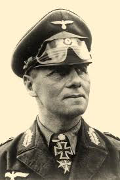
On July 16, Rommel was badly wounded when Allied airplanes struck his car, and he was removed from command. Four days later, an attempted assassination of Hitler failed and Rommel was one of those blamed. Rommel had played no part in the July 20 bombing, but he was branded a traitor all the same because the officers who had planned the assassination attempt had said that they wanted Rommel to succeed Hitler as German leader. Rommel chose to take his own life rather than be tried and executed, and he died on Oct, 14, 1944. The public proclamation of his death stated that he had died as a result of injuries he sustained in the July car attack. He was buried with full military honors. He left behind his wife and a son and daughter. |
|
Social Studies for Kids
copyright 2002–2026
David White




